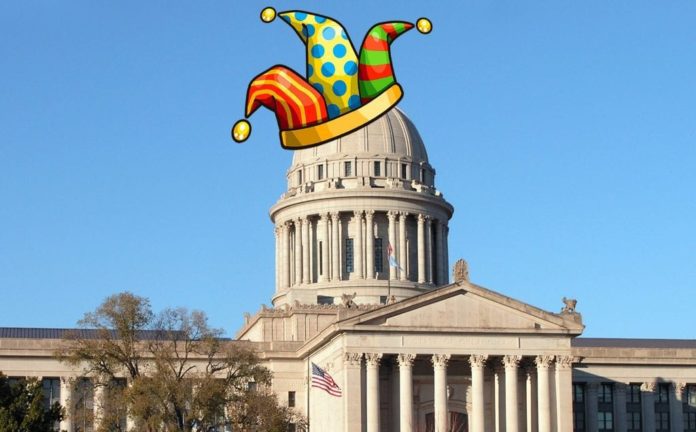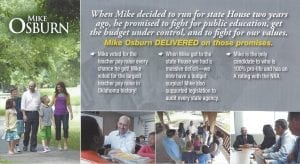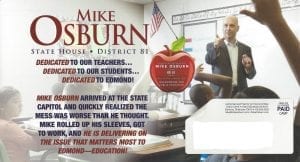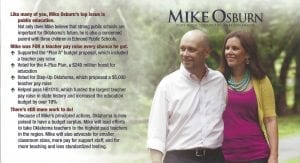BY ARNOLD HAMILTON
 If you doubt statehouse Republicans fear a “Remember in November” backlash on Tuesday, check your mailbox or social media feed.
If you doubt statehouse Republicans fear a “Remember in November” backlash on Tuesday, check your mailbox or social media feed.
The GOP supermajority that dug in its heels last spring and refused to spend more money for starving schools now is doing everything possible to recast itself as public education’s staunchest advocates.
A classic – but by no means the only – example of such duplicity is state Rep. Mike Osburn.
Osburn’s Edmond area district [HD 81] is about a reliably Republican as any in the state.
Yet he appears to be facing an unexpectedly strong Democratic challenge from Jackie Phillips, a small business owner [printing] currently serving as co-president of Edmond Memorial High School’s PTO [Parent-Teacher Organization].
Osburn is no doubt in the “Remember in November” crosshairs because he voted repeatedly to block lawmakers from considering proposals aimed at generating more money for public school operations.
“Mike Osburn is for public schools,” declared one of his mailers. “It’s the reason he ran for State Representative … and he has NEVER WAVERED.”
Not exactly.
It is true Osburn voted to give teachers their first across-the-board pay hike in about a decade.
The problem is, GOP leaders – whose strategies Osburn unwaveringly supported – thought they could forestall a teacher revolt with the salary increase. What they failed to understand is educators weren’t focused primarily on the region’s lowest teacher pay.
Their two-week walkout – which came well after the pay raise – was about reversing the nation’s deepest public school budget cuts, imposed under eight years of unified government at NE 23rdand Lincoln Blvd.
It was a real eye-opener for teachers that many Republican lawmakers, including Osburn, refused day-after-day to even allow a vote on revenue-generating proposals [think re-imposing the capital gains tax] to help schools forced to make-do with four-day weeks, overcrowded classes and decades-old textbooks and technology.
Explaining his position to constituents, Osburn insisted last spring he voted against “motions to bring those bills straight to the floor” because “it is political theater by the minority party designed only to stir up discontent.”
“Capital gains was negotiated out of the package by both parties,” Osburn said, “and they [Democrats] are showing a lack of good faith bringing it up over and over.
“We do not have the votes to pass them.”
It is true that the capital gains deduction – enacted in 2004 via SQ 713 – was a bipartisan initiative promoted by former state Treasurer Scott Meacham, then serving as Democratic Gov. Brad Henry’s finance secretary.
But it’s disingenuous to claim legislative Democrats in 2018 had any real voice in the decision to take capital gains “out of the package.” After all, Democrats had only 28 of 101 House and eight of 48 Senate seats – in other words, no real legislative leverage except to make a case to the general public.
[Note: the capital gains tax deduction primarily benefits the state’s wealthiest residents and is estimated to siphon between $150 million and $200 million annually out of state coffers that could bolster public schools and other vital services.]
Moreover, it’s a political smokescreen to insist “we do not have the votes to pass them.” You never really know until you give it an up-or-down vote … with the public watching.
The GOP leadership, of course, was between the proverbial rock-and-a-hard-place.
If they allowed the capital gains vote, it might be approved – angering key Republican campaign donors [think: carbon barons like Harold Hamm and Larry Nichols]. If it failed, it would enrage teachers and education advocates who would then see clearly the GOP majority was prioritizing the donor class over the working class.
Efforts to recast Republicans as public ed’s No. 1 advocates depend almost entirely on short memories or voter ignorance.
But it’s clear from the deluge of mailers and around-the-clock social media campaigning that GOP leaders fear their statehouse dominance – governor and both legislative houses – are in serious jeopardy.
– Arnold Hamilton is editor of The Oklahoma Observer












